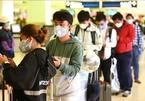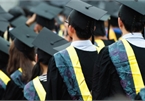Universities in Vietnam all state that they are ready to admit students who have returned to Vietnam because of Covid-19 and want to continue studying here.

VinUniversity in Vietnam
However, a question has been raised if students can study at Vietnam’s schools if there are big differences between Vietnamese and foreign curricula and training methods.
Nguyen Tien Thao from the Hanoi National University said there was no need to worry about returning students’ ability to follow Vietnam’s curricula.
| The students who cannot meet the requirements to follow the training programs they choose will be introduced to other training programs, or encouraged to go to junior colleges (3-year training) or intermediate schools (2-year training). |
“All schools will have to establish enrollment councils to assess students’ abilities, referring to the rankings of the foreign schools the students once studied at, and the learning records of the students,” he explained.
“We won’t admit all students returning from overseas schools automatically,” he said.
The students who cannot meet the requirements to follow the training programs they choose will be introduced to other training programs, or encouraged to go to junior colleges (3-year training) or intermediate schools (2-year training).
According to Nguyen Phong Dien from the Hanoi University of Science and Technology, there are many different programs for returning students to choose from.
The school has 12 programs with teaching in English, 10 international joint training programs with teaching in English, French, German and Japanese. There are also programs under which credits are recognized mutually by parties and students can transfer credits to study at the partner schools.
Vu Thi Hien from the Hanoi Foreign Trade University (FTU) also said the exchange of international students is implemented regularly. The school has international joint training programs for bachelor's and master's degrees.
According to Hien, some students of the school left FTU after two years of study to study abroad because this is believed to be better than domestic training.
“I think that Covid-19 is an opportunity for students to come back to Vietnam to see how the training quality of Vietnamese schools has changed,” Hien said.
Pham Pho, former rector of the Sai Gon Economics & Polytechnic Junior College, said there are two groups of returning students.
The first group comprises students studying abroad who have real learning capability. Many of them left to study abroad with scholarships granted by their schools. The students can easily adapt to the training curricula applied by schools in Vietnam, including the most prestigious state-owned schools.
The second group comprises students who don’t have good learning capability. Many of them went abroad because they failed university entrance exams in Vietnam and they studied at schools with low rankings overseas.
Le Ha

Universities told to be selective about returning students
Universities in Vietnam are welcoming returning students, but say that they will only admit students who can satisfy their requirements.

WB grants US$422 mln to higher education, urban development projects in Vietnam
The World Bank Board of Executive Directors on June 30 approved financing for two projects worth a total of US$422 million to help build a climate-resilient city in the Mekong Delta and improve the quality of Vietnam’s three national universities.
 If the educational environment changes, training quality improves, and teaching methods are more reasonable, students will choose to stay in Vietnam to follow tertiary education instead of going abroad, educators believe.
If the educational environment changes, training quality improves, and teaching methods are more reasonable, students will choose to stay in Vietnam to follow tertiary education instead of going abroad, educators believe.